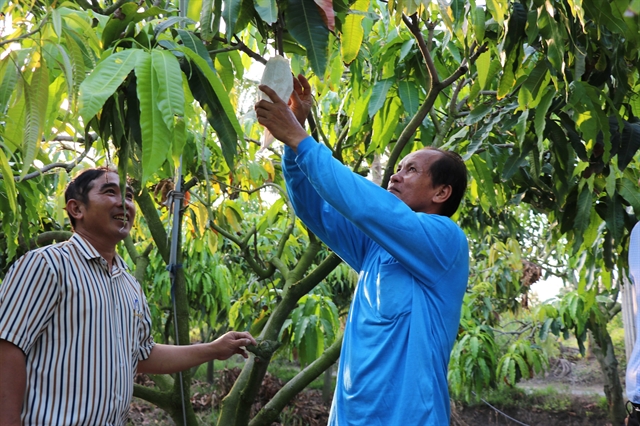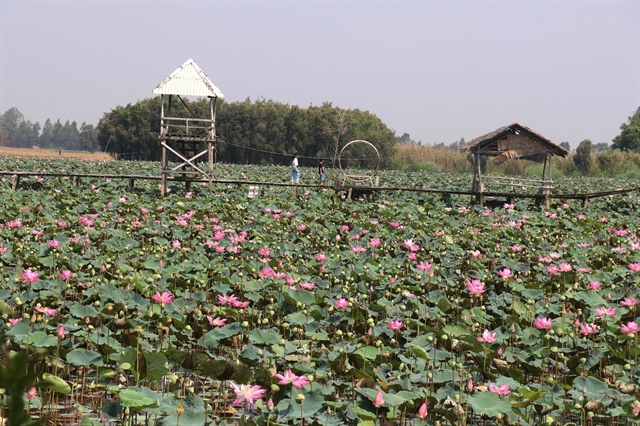 Society
Society

 |
| A 2.5ha mango orchard is planted under the organic farming method in Đồng Tháp Province’s Tam Nông District. Young mangoes are covered with plastic bags to prevent pests. – VNA/VNS Photo Minh Hưng |
ĐỒNG THÁP – More farmers in Đồng Tháp Province have switched to cultivating their crops under the organic farming method because it improves product quality and value, and is environment friendly and sustainable.
The Cửu Long (Mekong) Delta province has large potential for developing organic agriculture as it has vast fertile farmlands.
It has implemented various organic farming models and they are operated effectively, according to its People’s Committee.
Trần Ngọc Ân, chairman of the Tân An Farmers Clubhouse in Cao Lãnh City’s Mỹ Tân Commune, says the club's members grow organic mangoes and enjoy high economic efficiency.
Using a large quantity of chemical fertilisers and pesticides to grow crops will have a negative impact on soil fertility and cause high production costs and unstable product sales, he says.
The cultivation of mango under organic farming has helped trees grow and have high-quality fruit, offering a profit of VNĐ1,000 a kilo, higher than traditionally-grown mangoes, he says.
“My family is using advanced farming techniques to harvest fruits year-round to provide favourable conditions for buyers. With this farming method, after deducting production cost, my family earns a profit of VNĐ300 million (US$11,900) a year,” he says.
The prices of off-season mangoes are 1.5 – 2 times higher than main-season mangoes, according to farmers.
Mango is one of the province’s key agricultural products, with more than 14,900ha of mango planted in Đồng Tháp, the delta’s largest mango growing province.
Nguyễn Văn Vũ Minh, director of the province Department of Agriculture and Rural Development, says the province has 8,368ha of mango that have been granted production codes, including 280ha planted with organic methods.
The province has also developed growing more organic rice to meet export requirements.
The organic rice growing model of the Phú Thọ Co-operative in Tam Nông District’s An Long Commune has been implemented effectively on 14ha with the participation of 10 members.
Participating in the model, the members are trained in techniques to grow and tend rice, and after harvesting paddy, they use straws to plant rice mushrooms, with the used straws then used to make organic fertiliser.
Phan Hoàng Em, deputy director of the co-operative, says the model is economically effective, protects the environment and is safe for farmers and consumers.
“The model’s average rice yield is 10-15 per cent higher than traditional growing methods. Rice plants grow well, have strong roots and few diseases,” he says.
Nguyễn Văn Quý, chairman of the An Long Commune People’s Committee, says: “The model of growing rice with organic farming methods under the co-operation between the Phú Thọ Co-operative and the Quế Lâm Group has helped to change the awareness of farmers about switching from individual small-scale farming to concentrated large scale farming, which features a contract between farmers and companies under the State’s management.”
The province has developed 20ha of organic lotus planted by seven households in Tháp Mười District’s Hưng Thạnh Commune.
The lotus area uses mechanisation and high-tech farming, and enjoys secure buyers.
Đồng Tháp, which is the delta’s largest lotus producing province, has more than 1,108ha of lotus, and lotus farmers earn an average profit of VNĐ42 million ($1,700) per hectare a year.
Many farmers have offered eco-tourism services at their lotus fields to improve income.
Nguyễn Trường An in Tháp Mười District’s Mỹ Hoà Commune says previously he only grew lotus to harvest lotus seeds and stems and the profit was unstable.
After switching to offering tourism services at his 3ha lotus field and selling lotus products to tourists, he earns a higher profit.
Tháp Mười District, the province’s largest lotus growing area, has 152ha of lotus fields offering eco-tourism services.
To develop organic agriculture, the province’s relevant departments and agencies have implemented various measures and policies to support farmers.
The province’s Plant Cultivation and Protection Sub-department in co-operation with the province Union of Science and Technology Associations have organised many seminars to provide farmers knowledge about the role of organic fertilisers in crop cultivation in Hồng Ngự, Lấp Vò and Tháp Mười districts.
The union has strengthened advocacy activities about organic farming models which control plant diseases and improve product quality, and enhance the awareness of farmers about switching to use organic fertilisers and plant protection bioproducts.
The switch has helped reduce environmental pollution, increase profit and secure the health of farmers and consumers.
Mai Hữu Tâm in Châu Thành District’s An Nhơn Commune says that previously, when growing longan, he used organic fertilisers bought from fertiliser shops and the trees grew but the production cost was high.
“After participating in seminars about making organic fertilisers organised by the union in 2023, I and other farmers in the commune have made organic fertiliser from water hyacinths to fertilise our orchards. Making organic fertiliser helps reduce production cost by 30 per cent while the fruit yield is secured and it contributes to protect the environment,” he says.
The province provided training about organic agriculture for 40 agricultural officials last year and organised for them to visit organic farming models. – VNS
 |
| A lotus field offers tourism services in Đồng Tháp Province’s Tháp Mười District. – VNA/VNS Photo Nguyễn Văn Trí |